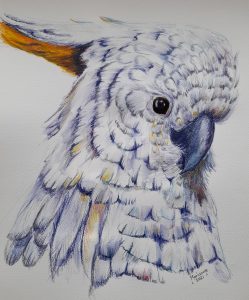
The rusty flatbed lumbered along the track, the wire cage on the tray rattling and lurching with every rut. The old man heard the bird squawking. This was the place.
He pulled off where the track ran down and across the creek, where the water ran shallow, clear and cold over glistening stones, under a canopy of she-oaks and eucalypts. This was the place. He’d seen them flock here at night, winging in across the plains in twos and threes. They would chatter and fuss as the sky turned orange and pink and mauve and the reflections of the trees in the riverbend darkened and disappeared. He hooked the cage on a low limb. The bird turned its head to the side and stared at him with one round, black eye.
He lit himself a fire. This was the place.
The flock was gathering now, swooping down to roost, clambering and screeching. Pouring his tea, he glanced up at the bird in the cage, still as stone on his perch. Finnegan, she’d called him. The old man sipped his tea. There was time yet.
He woke once in the night, as was his habit. He raked over the remaining coals and coaxed a mild brew from the heat. The night breeze moved the wire cage and ruffled the feathers of the still bird inside. Back in his swag, the man dreamed of his wife as a new bride, shy and watching, half turned to face him.
He awoke on the second day to the chattering of the birds in the canopy, soft and scattered at first, increasing to a chorus as the sky lightened. Rising in the chill air, he gathered kindling and set a fire. Finnegan was stretching and preening, drawing his tail feathers slowly through his crusty, black beak, his dark eye fixed on the old man.
After breakfast, when the last of the flock had taken wing, the old man opened the cage door. The bird eyed him curiously and clambered along the perch. He paused at the door, then hopped unsteadily to the opening and flapped to the branch above.
All the morning the cockatoo perched there, watching the old man as he washed in a billy of warm water, ate his eggs and bacon, rested his wiry frame against the trunk of the tree. In the afternoon Finnegan hopped to the next branch, nibbled on a twig, sat still, always watching. As the light faded and he heard the flock circling in, he returned to the cage and the old man closed the door.
That night the old man dreamed of his wife as mother, infant son in her bicycle basket, the bird perched proudly on the handlebars. She turned and waved, pretty and glad, then righted the wobbling cycle and pedaled away.
The third day he woke again to the strident shrieks of the departing flock. After breakfast he took down the cage. Reaching in, he offered a gnarled finger and the bird clambered on. The old man drew his hand from the cage. His old wife had loved this bird. He gently stroked the snowy breast, noted the lemony undersides of the wings and tail, the crusty grey claws and beak, the yellow crest. Finnegan eyed him impassively. The old man returned the bird to the cage, hung it back on the low limb, and sat, staring into the flickering flames, remembering. That night he left the cage door open.
In the night he was rocked by dreams of the past: his wife in a garden; older now and cradling a grandchild; now her face drawn in grief; young again on the bicycle, half-smiling and turned to him with belly round and proud. He woke in the dark with his face wet. In the dense upper canopy of the eucalypt the flock was still, and he saw the dark huddled form of the bird on the branch.
He slept warm and deep now, and dreamed of his old wife in his arms. He woke at dawn, tied the empty cage to the truck and pulled out onto the dirt track, the flock wheeling and screeching and whistling across the paddocks behind him.
Finnegan’s Release won the “Encouragement Award” in the EJ Brady Short Story Competition (very short story category) one year recently. Before I started keeping records.